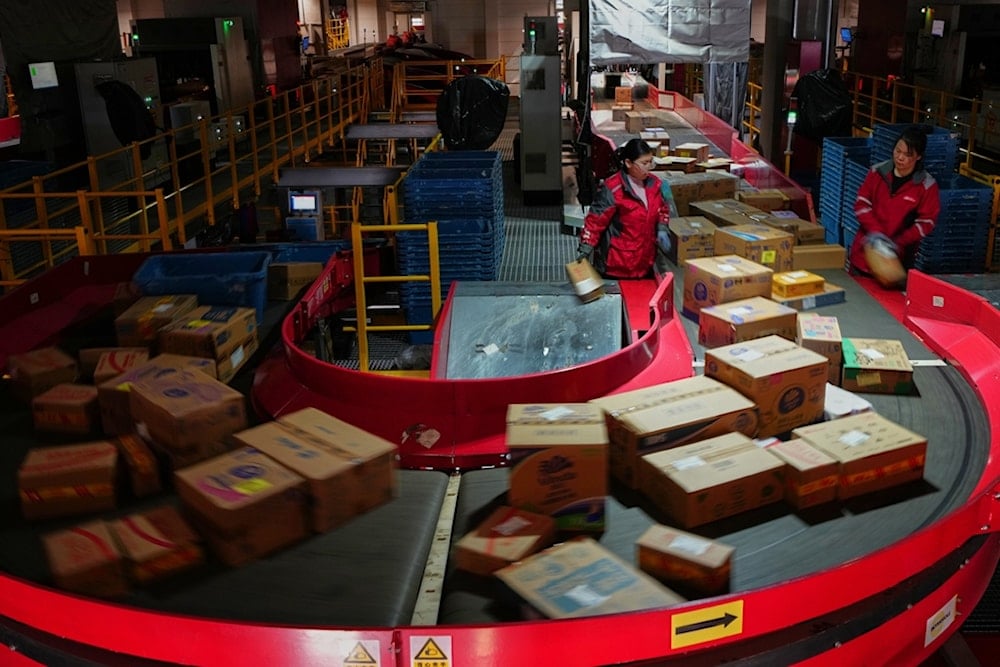EU seeks to fast-track fee on cheap Chinese online parcels to 2026
The EU plans to accelerate a handling fee on small Chinese online parcels by early 2026, aiming to protect domestic retailers.
-

Workers sort out parcels at a distribution center for e-commerce platform JD.com, in Beijing, China, on November 11, 2025 (AP)
The European Commission has proposed accelerating an EU-wide handling fee on small packages ordered from Chinese e-commerce platforms, including Shein, Temu, and Alibaba, to early 2026, more than two years ahead of the original schedule.
The move aims to curb billions of low-cost imports and protect domestic retailers from what Brussels views as unfair competition.
In a letter to EU finance ministers obtained by the Financial Times, EU Trade Commissioner Maros Sefcovic described the initiative as “a crucial step in ensuring the European Union bolsters its position in the face of rapidly changing trade realities.”
He added that the accelerated timeline “would send a strong signal that Europe is serious about increasing its competitiveness and ensuring fair conditions for its businesses.”
The proposal, which precedes a G20 summit where European leaders are expected to address trade issues with Chinese President Xi Jinping, reflects a more aggressive EU stance towards China. Under the commission’s May plan, the €150 threshold for customs duties on imported goods would be scrapped by mid-2028, while a flat €2 fee per package would be introduced.
Chinese sellers accounted for over 80% of the 4.6 billion parcels purchased by European consumers last year.
EU to shield businesses from Chinese dominance
Sefcovic emphasized the urgency, noting that “European industries, particularly retailers, have repeatedly underlined that this distortion of competition be removed without delay.”
“It will be extremely difficult to explain to our businesses and citizens why the EU cannot act faster,” he added.
EU capitals will now need to agree on the revised timeline and negotiate the flat customs fee. Some member states, including Romania, have already imposed national fees of up to €5, a development that the commission said made accelerated action necessary.
“This is not a technical matter, it is a question of Europe’s capacity to act in defence of its economic interests,” Sefcovic said.
“A modern, competitive Europe must be able to better protect its border for goods and uphold fair competition,” he claimed.
Read more: China-EU trade: New ‘air silk road’ links Xinjiang to Europe
State support unfair when it weakens the West
The European Commission and Western governments have long argued that the Chinese economy enjoys structural advantages that constitute unfair trade. They say that state backing, low production costs, and massive subsidies enable Chinese firms to undercut competitors abroad.
In fact, China has achieved striking scale and dominance in sectors such as batteries, photovoltaics, and electric vehicles (EVs), driven in part by a deliberate industrial policy. The European Union itself launched an anti‑subsidy investigation into Chinese EV imports in October 2023, and proceeded to signal the possible imposition of duties ranging from 17.4 % to 38.1 % on Chinese producers for what it regards as unfair subsidization.
Yet from Beijing’s vantage, these critiques often ring hollow. EU and US firms benefit from public support, tax incentives, strategic procurement, and favourable regulatory frameworks. Meanwhile, criticism is consistently deployed against Chinese companies. For instance, Chinese officials have described the EU’s Foreign Subsidies Regulation (FSR) as a tool of “selective enforcement” targeting Chinese firms, resulting in claimed losses of over $2 billion.
Beijing further argues that the West champions “free trade” only so long as it serves Western producers but draws the line when competition cuts against entrenched incumbents.
While Brussels and allied capitals frame Chinese industrial policy as a distortion of competition, the Chinese perspective holds that Western economies tolerate similar distortions when they favour domestic players, and simply object when China leverages its size and strategies to compete strongly. This dynamic lies at the core of the ongoing Western criticism; it is less about the existence of state support and more about who uses it and how they use it.
Read more: Taiwan’s VP urges EU to deepen cooperation against China

 4 Min Read
4 Min Read










